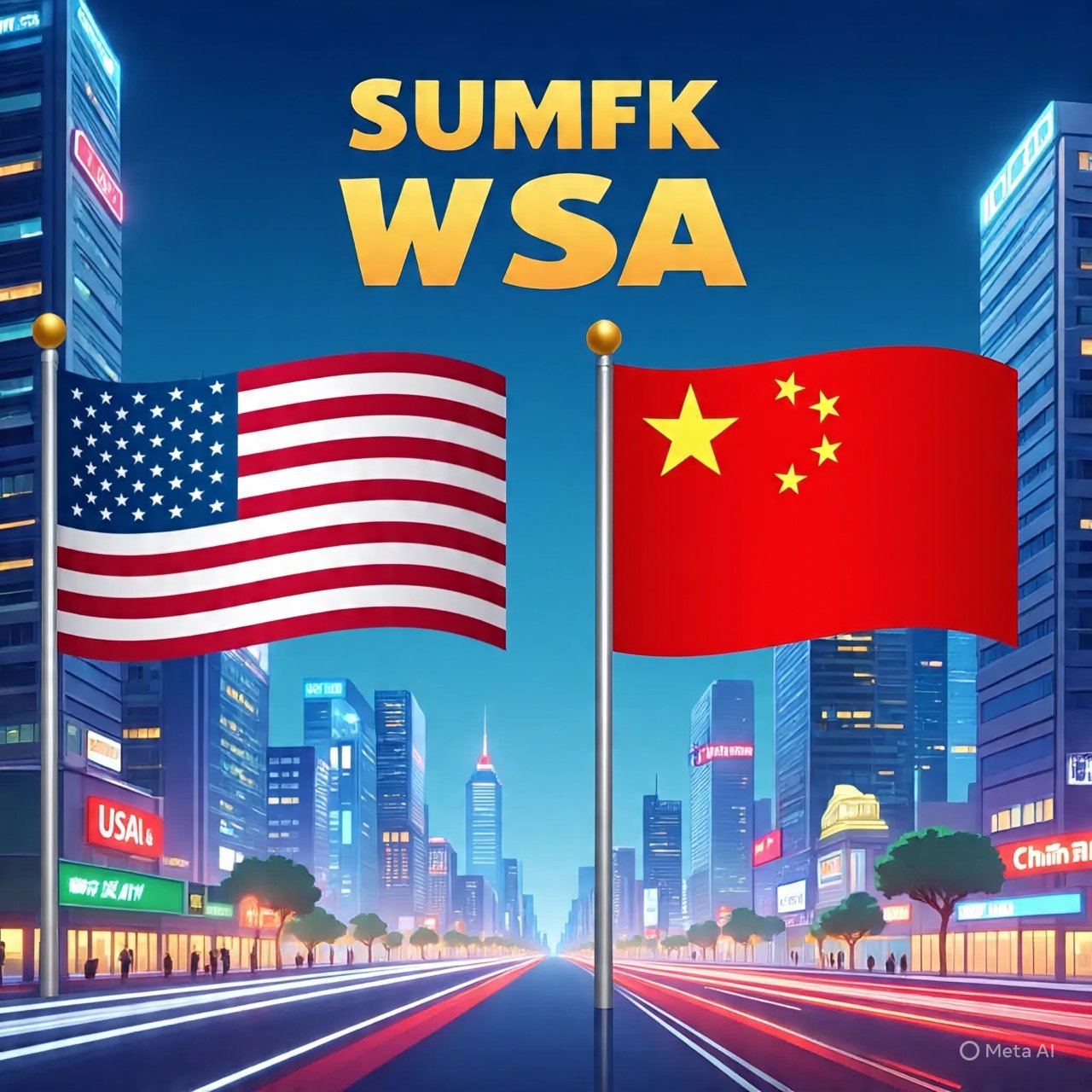Internet War: The Clash of Two Superpowers
Introduction: The Internet War – Clash of Two Superpowers
The Cold War of the 20th century divided the world into two opposing ideological blocs, but the digital war of the 21st century has given this division a new form. The ongoing internet war between the United States and China is not merely a race for technological superiority, but rather a struggle for the future global order, economic dominance, and civilizational models. This war is being fought on every front – from the fundamental structure of the internet to the ethical principles of artificial intelligence, and from 5G networks to cybersecurity standards. Both countries are trying to impose their respective internet models globally – America’s open, decentralized model that emphasizes individuality and freedom of expression, and China’s controlled, centralized model that prioritizes collective interest and state order. This conflict is not only shaping relations between the two countries but also determining the future of the internet for the entire world.
Two Contrasting Internet Philosophies: Openness vs Sovereignty
There is a fundamental difference in the basic perspectives of the United States and China regarding the internet. The American model is based on the concept of “cyber freedom,” aiming for free movement of information, protection of citizens’ digital rights, and creating an environment where innovation can flourish. In contrast, the Chinese model adheres to the principle of “internet sovereignty,” which prioritizes national security, collective interest, and social harmony over individual rights. This philosophical difference is clearly visible in both countries’ internet policies. America has adopted a multi-stakeholder model where government, private sector, and civil society jointly participate in internet governance, while China has established a state-centric model where the government plays a central role in internet development, organization, and content control. This fundamental difference is the root of conflict between the two countries, as each nation tries to promote its model internationally.
Technology Race: From Chips to Cloud
The race between the United States and China in the field of technology is ongoing in every sector. In chip manufacturing, American companies like Intel and Qualcomm still dominate, but China’s Semiconductor Manufacturing International Corporation (SMIC) and Huawei are rapidly developing. In artificial intelligence, America’s Google, Microsoft, and OpenAI have made significant advances, while China’s Baidu, Alibaba, and Tencent have also achieved important successes in this field. In cloud computing, while Amazon Web Services and Microsoft Azure dominate globally, China’s Alibaba Cloud and Tencent Cloud are strengthening their presence in Asia. This technology war is not just about commercial competition but is linked to national security. Both countries are trying to achieve self-reliance in sensitive technology sectors, especially technologies that are important for military use.
5G and 6G War: Network Dominance
The war over communication networks is the most prominent front between the United States and China. China’s Huawei and ZTE have achieved global leadership in 5G technology, which has raised national security concerns in America. The United States has targeted Huawei with sanctions, accusing it of having ties with the Chinese military. In response, China has emphasized its technological self-reliance and accelerated the development of 6G technology. Both countries are now engaged in the race to set 6G standards, as this will form the foundation of the future digital economy. America is promoting open and interoperable technologies like “Open RAN,” while China relies on closed systems under its control. This war is not limited to commercial interests but is related to control over future global communication infrastructure.
Cybersecurity: The Secret War
A secret war is ongoing between the United States and China on the cybersecurity front. Both countries accuse each other of stealing sensitive information, conducting cyber attacks on infrastructure, and attempting to disable each other’s defense systems. The competition between America’s Cyber Command and China’s People’s Liberation Army Unit 61398 continues in cyberspace worldwide. This war focuses on privacy protection, data security, and protection of national infrastructure. Both countries regularly accuse each other of stealing trade secrets, intellectual property theft, and cyber espionage. This cyber war sometimes becomes visible at the public level, such as Chinese hacker attacks on Microsoft Exchange servers or American cyber attacks on Chinese government institutions.
Global Influence: Digital Diplomacy
Both the United States and China are trying to promote their internet models internationally. America promotes the concept of “internet freedom” and advocates for an open and interoperable internet in international forums. China is exporting its technology infrastructure to developing countries under the “Digital Silk Road” project. Both countries are trying to increase their influence in international organizations like the Internet Corporation for Assigned Names and Numbers (ICANN) and the International Telecommunication Union (ITU). China’s “internet sovereignty” theory is influencing several authoritarian governments, while America’s “open internet” model is popular in democratic countries. This digital diplomacy is not only affecting the balance of power between the two countries but also determining the future of the internet worldwide.
Digital Economy: E-commerce War
There is intense competition between the United States and China in the field of digital economy. Compared to America’s Amazon, Google, and Facebook, China’s Alibaba, Tencent, and JD.com have strengthened their presence not only in China but worldwide. Besides e-commerce, in the digital payments sector, China’s Alipay and WeChat Pay have achieved global success, while America’s PayPal and Apple Pay are still mostly limited to Western countries. This war is not just about market share but is related to data control. There is ongoing conflict between the two countries over data location, data privacy standards, and digital taxation issues. China has implemented a Data Security Law that prevents Chinese citizens’ data from being transferred outside the country, while America tries to access American citizens’ data through the Cloud Act.
Technology Export: War of Global Influence
There is intense conflict between the United States and China over technology export. America has imposed sanctions on several Chinese technology companies and appealed to its allied countries to reject Chinese technology. China has taken countermeasures by imposing sanctions on American technology companies and emphasizing its technological self-reliance. This war is not only linked to commercial interests but also to global influence. Both countries are trying to increase their influence over developing countries by exporting their technology to these nations. China’s “Digital Silk Road” initiative is being successfully implemented in African, Latin American, and Asian countries, while America is trying to maintain its influence through “Digital Partnership.”
Data Governance: Information War
There is deep disagreement between the United States and China over data governance. America supports the free movement of data, while China emphasizes national control of data. This disagreement is evident in international data transfer standards, data privacy laws, and data location issues. China has implemented a Data Security Law that prevents Chinese citizens’ data from being transferred outside the country, while America tries to access American citizens’ data through the Cloud Act. Both countries are promoting their respective data models in international forums, which has raised questions about the future of global data governance.
Artificial Intelligence: Future War
The race between the United States and China in the field of artificial intelligence has opened a new front. Both countries are trying to outdo each other in investing in artificial intelligence development. America’s Google, Microsoft, and OpenAI have made significant advances in artificial intelligence, while China’s Baidu, Alibaba, and Tencent have also achieved important successes in this field. This war is not limited to commercial interests but is related to military use, surveillance systems, and the future economy. Both countries are trying to increase their influence over artificial intelligence ethical principles, usage standards, and international laws.
Internet Division: Digital Curtain
The conflict between the United States and China has given rise to internet division, which some observers call the “Splinternet” or “Digital Curtain.” China has established its own separate internet ecosystem including local services like Baidu, Alibaba, Tencent, and WeChat. In America and its allied countries, Google, Facebook, Twitter, and other global platforms dominate. This division is not only creating differences in technology standards but also affecting cultural exchange, information flow, and international cooperation. Connections between the two systems are decreasing, which has raised questions about the future of the global internet.
Technology Self-Reliance: Supply Chain War
Chip shortages and supply chain problems have pushed both countries toward technological self-reliance. America has promoted semiconductor production within the country through the CHIPS Act, while China has tried to achieve self-reliance in chip manufacturing through the “China National Integrated Circuit Industry Investment Fund.” This war is not limited to chip manufacturing but also includes rare earth elements, electronic components, and other important sectors of technology. Both countries are trying to secure their supply chains and reduce dependence on the other country.
Internet Laws: Digital Law War
There is deep disagreement between the United States and China over internet laws and regulations. America advocates for a light-touch regulatory model that promotes innovation, while China believes in strict laws and regulations that ensure national security and social stability. This disagreement is evident in content control, data privacy, cybercrime, and internet responsibility issues. Both countries are promoting their respective legal models in international forums, which has raised questions about the future of global internet governance.
Digital Bridges: Connection Efforts
Although the conflict between the United States and China is intense, some connection efforts are also ongoing between the two countries. Talks on cybersecurity issues continue between the two countries, and some commercial partnerships are established. However, these connections have failed to resolve fundamental differences. There is a severe lack of trust between the two countries, and each side views the other’s intentions with suspicion.
Future Prospects: Continued War or Cooperation?
There are various possibilities for the internet war between the United States and China in the coming years. One possibility is that this war will continue indefinitely, further dividing the internet. Another possibility is that both countries will learn to cooperate to some extent, especially on global challenges like cybercrime and ethical principles of artificial intelligence. A third possibility is that conflict between the two countries will increase, intensifying the technology war even further.
Conclusion: Implications for the World
The outcome of the internet superpower war between the United States and China has profound implications not only for both countries but for the entire world. This war will determine the future of internet freedom, digital rights, global trade, and international relations. Whatever the outcome, it is clear that the internet is no longer a neutral technology but has become an important arena of global power politics.


